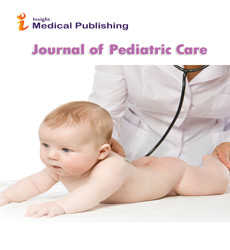Nutritional Interventions in Early Childhood: Long-term Impacts on Growth and Cognitive Development
Amelia Brown
Department of Pediatrics, Boston Children’s Hospital, Harvard Medical School, Boston, MA, USA
Published Date: 2025-02-28DOI10.4172/2469-5653.11.1.279
Received date: February 03, 2025, Manuscript No. ipjpc-25-20815; Editor assigned: February 05, 2025, PreQC No. ipjpc-25-20815 (PQ); Reviewed date: February 17, 2025, QC No. ipjpc-25-20815; Revised date: February 22, 2025, Manuscript No. ipjpc-25-20815 (R); Published date: February 28, 2025, DOI: 10.4172/2469-5653.11.1.279
Citation: Brown (2025) Nutritional Interventions in Early Childhood: Long-term Impacts on Growth and Cognitive Development. J Pediatr Vol.11 No.1: 279
Introduction
Early childhood, particularly the first 1,000 days of lifeâ??from conception to two years of ageâ??represents a critical window for growth, development, and long-term health. Nutrition during this period plays a decisive role in shaping physical growth, brain development, and cognitive outcomes. Malnutrition, whether in the form of deficiencies, undernutrition, or overnutrition, has lasting consequences that may extend into adulthood. Therefore, targeted nutritional interventions in early childhood are increasingly emphasized in public health and clinical research to optimize both immediate and long-term outcomes. The rapid growth and development of the brain during early childhood demand an adequate supply of energy, protein, and essential micronutrients. Key processes such as neurogenesis, myelination, and synaptogenesis depend on nutrient availability. Deficiencies in iron, iodine, zinc, vitamin A, and essential fatty acids during this period can impair cognitive function, learning ability, and memory. Thus, ensuring optimal nutrition in early life provides a strong foundation for lifelong health and productivity [1].
Description
Exclusive breastfeeding for the first six months, followed by continued breastfeeding with complementary foods, is recognized as one of the most effective early-life nutritional interventions. Breast milk provides a balanced source of macronutrients, bioactive compounds, and immunological factors that promote growth and cognitive development. Studies have linked breastfeeding to improved intelligence quotient (IQ), better academic performance, and reduced risk of chronic diseases in later life. Promoting breastfeeding is therefore a cornerstone of early childhood nutritional strategies. After six months, complementary feeding becomes essential to meet the increasing nutritional demands of growing infants. The timing, quality, and diversity of complementary foods significantly affect growth trajectories [2].
Diets rich in fruits, vegetables, animal proteins, and fortified foods provide critical nutrients that prevent stunting, wasting, and cognitive delays. Poor complementary feeding practices, by contrast, contribute to malnutrition and long-term developmental impairments. Targeted micronutrient interventions have proven effective in preventing developmental deficits. Iron supplementation reduces the risk of anemia-related cognitive impairment, while iodine fortification supports thyroid function critical for brain development. Vitamin A supplementation lowers child morbidity and mortality, while zinc supports immune function and growth. These interventions, when delivered through public health programs, significantly improve survival, growth, and neurodevelopmental outcomes [3].
Adequate protein and energy intake are central to both somatic and cognitive development. Proteinâ??energy malnutrition in early childhood is strongly associated with stunting, reduced muscle mass, and impaired cognitive performance. Interventions focusing on protein-rich foodsâ??such as dairy, legumes, eggs, and fishâ??have been shown to enhance both physical growth and school readiness. Balanced energy intake also prevents early onset obesity, which has its own negative consequences for long-term health [4].
The connection between nutrition and cognitive development is particularly compelling. Longitudinal studies demonstrate that children who receive adequate nutrition in early life exhibit better school performance, memory, attention, and problem-solving skills. Conversely, malnutrition contributes to reduced cognitive reserve, limiting educational and economic opportunities in adulthood. Nutritional interventions thus provide not only biological benefits but also socioeconomic advantages for individuals and societies. Community-level programs, such as food fortification, supplementation campaigns, and maternal education initiatives, enhance access to essential nutrients [5].
Conclusion
Nutritional interventions in early childhood are pivotal in determining long-term growth and cognitive development. From breastfeeding and complementary feeding to micronutrient supplementation and maternal nutrition, these strategies ensure optimal physical and mental outcomes. While challenges remain in ensuring universal access and compliance, the benefits of early-life nutrition extend beyond individual health to broader societal and economic well-being. Investing in nutrition during the earliest stages of life is therefore not only a health imperative but also a strategic investment in human capital and sustainable development.
Acknowledgement
None.
Conflict of Interest
None.
References
- Nicklas TA, O'Neil CE, Fulgoni III VL. (2020). Nutrient intake, introduction of baby cereals and other complementary foods in the diets of infants and toddlers from birth to 23 months of age.AIMS Public Health 7: 123.
Google Scholar Cross Ref Indexed at
- Gardner R, Feely A, Layte R, Williams J, McGavock J. (2019). Adverse childhood experiences are associated with an increased risk of obesity in early adolescence: A population-based prospective cohort study. Pediatr Res86: 522-528.
Google Scholar Cross Ref Indexed at
- Chowdhury MRK, Rahman MS, Khan MMH, Mondal MNI, Rahman MM, et al. (2016). Risk factors for child malnutrition in Bangladesh: A multilevel analysis of a nationwide population-based survey. J Pediatr172: 194-201.
Google Scholar Cross Ref Indexed at
- Hadi H, Fatimatasari F, Irwanti W, Kusuma C, Alfiana RD, et al. (2021). Exclusive breastfeeding protects young children from stunting in a low-income population: A study from Eastern Indonesia. Nutrients13: 4264.
Google Scholar Cross Ref Indexed at
- Hanif HM. (2011). Trends in breastfeeding and complementary feeding practices in Pakistan, 1990-2007. Int Breastfeed J6: 15.
Open Access Journals
- Aquaculture & Veterinary Science
- Chemistry & Chemical Sciences
- Clinical Sciences
- Engineering
- General Science
- Genetics & Molecular Biology
- Health Care & Nursing
- Immunology & Microbiology
- Materials Science
- Mathematics & Physics
- Medical Sciences
- Neurology & Psychiatry
- Oncology & Cancer Science
- Pharmaceutical Sciences
